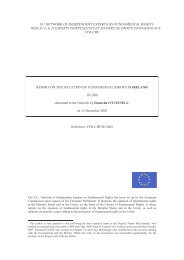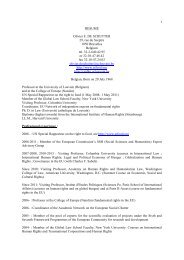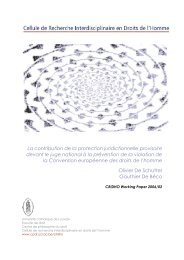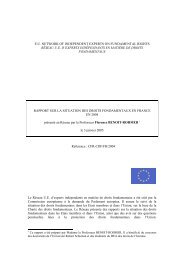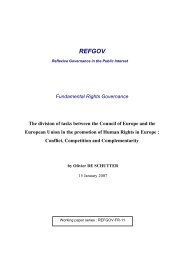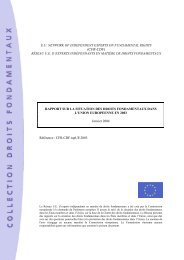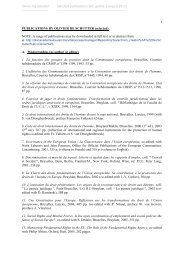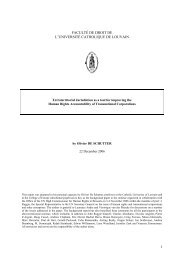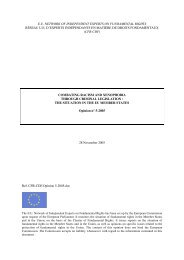The Prohibition of Discrimination under European Human ... - cridho
The Prohibition of Discrimination under European Human ... - cridho
The Prohibition of Discrimination under European Human ... - cridho
Create successful ePaper yourself
Turn your PDF publications into a flip-book with our unique Google optimized e-Paper software.
thematic report<br />
■ THE PROHIBITION OF DISCRIMINATION UNDER EUROPEAN HUMAN RIGHTS LAW ■<br />
in which case it will generally be analyzed, rather than <strong>under</strong> the non-discrimination clause <strong>of</strong> Article 14 ECHR, as<br />
an interference with rights such as the right to choose one’s sexual orientation or lifestyle (Article 8 ECHR), 61 to<br />
exercise one’s religion (Article 9 ECHR), 62 to express one’s opinions (Article 10 ECHR), 63 to join or to refuse to join an<br />
association (Article 11 ECHR), 64 to marry or to refuse to enter into a marital relationship (Article 12 ECHR) –,<br />
discrimination in employment and occupation will in principle not fall <strong>under</strong> the scope <strong>of</strong> application <strong>of</strong> Article 14<br />
ECHR. It is in order to expand the protection from discrimination in the system <strong>of</strong> the <strong>European</strong> Convention on<br />
<strong>Human</strong> Rights that Protocol n°12 additional to the ECHR was drafted and opened for signature on 4 November<br />
2000.<br />
3. Protocol n°12 to the ECHR (2000)<br />
Article 1 <strong>of</strong> Protocol n°12 to the <strong>European</strong> Convention on <strong>Human</strong> Rights contains a general prohibition <strong>of</strong><br />
discrimination :<br />
1. <strong>The</strong> enjoyment <strong>of</strong> any right set forth by law shall be secured without discrimination on any ground such as<br />
sex, race, colour, language, religion, political or other opinion, national or social origin, association with a<br />
national minority, property, birth or other status.<br />
2. No one shall be discriminated against by any public authority on any ground such as those mentioned in<br />
paragraph 1.<br />
Although Article 1 <strong>of</strong> Protocol n°12 to the ECHR concerns only the « enjoyment <strong>of</strong> any right set forth by law », the<br />
protection from discrimination thus afforded by the Protocol goes beyond that afforded by Article 14 ECHR. 65<br />
Social security matters being covered <strong>under</strong> Article 1 <strong>of</strong> Additional Protocol n°1 to the ECHR since Gaygusuz, the<br />
areas concerned shall be, in particular, access to public places, access to goods, provision <strong>of</strong> services, access to<br />
nationality, and in certain cases access to employment. Where the discrimination is based on other grounds than<br />
on the exercise <strong>of</strong> rights protected <strong>under</strong> the ECHR, the <strong>European</strong> Court <strong>of</strong> <strong>Human</strong> Rights might rely on Protocol<br />
n°12 in order to extend its jurisdiction to those situations which, presently, are not covered <strong>under</strong> Article 14 ECHR.<br />
61<br />
62<br />
63<br />
64<br />
65<br />
Eur. Ct. HR (3d section), Smith and Grady v. the United Kingdom (Appl. N° 33985/96 and 33986/96), judgment <strong>of</strong> 27 September 1999<br />
(homosexuals discharged from the British Army, after investigations had revealed their homosexuality); Eur. Ct. HR (3d section), Lustig-Prean<br />
and Beckett v. the United Kingdom (Appl. N° 31417/96 and 32377/96), judgment <strong>of</strong> 27 September 1999 (same).<br />
See, e.g., Eur. Ct. HR, Kalaç v.Turkey (Appl. N° 20704/92), judgment <strong>of</strong> 1 July 1997, Rep. 1997-IV, p. 1209 (judge advocate in the Turkish air force<br />
forced to retire for what the Turkish authorities considered to constitute breaches <strong>of</strong> discipline and scandalous conduct: the applicant had<br />
adopted « unlawful fundamentalist opinions », in becoming a member <strong>of</strong> the Muslim fundamentalist Süleyman sect); Dahlab v. Switzerland<br />
(Appl. no. 42393/98, ECHR 2001-V (dismissal <strong>of</strong> a schoolteacher converted to Islam and wishing to wear a headscarf ).<br />
Eur. Ct. HR, Vogt v. Germany, judgment <strong>of</strong> 20 November 1995 (dismissal <strong>of</strong> the applicant from her post as a schoolteacher in the public<br />
educational system for having persistently refused to dissociate herself from the German Communist Party, as she considered that<br />
membership <strong>of</strong> that party was not incompatible with the duty <strong>of</strong> loyalty to the German Constitution imposed on all public servants : the<br />
Court considered that this constituted a violation <strong>of</strong> the freedoms <strong>of</strong> expression and association protected by the Convention, respectively in<br />
Articles 10 and 11).<br />
Ibid.<br />
See generally J. Schokkenbroek,“A New <strong>European</strong> Standard Against <strong>Discrimination</strong>: Negotiating Protocol n° 12 to the <strong>European</strong> Convention<br />
on <strong>Human</strong> Rights”, in J. Niessen and Isabelle Chopin (eds.), <strong>The</strong> Development <strong>of</strong> Legal Instruments to Combat Racism in a Diverse Europe, Martinus<br />
Nijh<strong>of</strong>f Publ., Leiden/Boston, 2004, pp. 61-79.<br />
24



